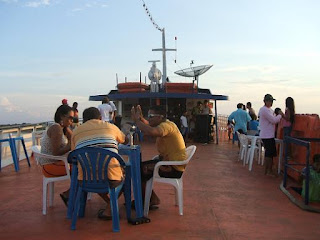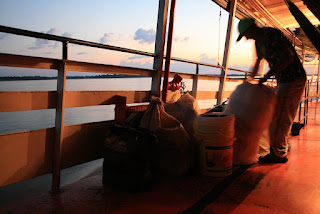`Four days by boat to Manaus? That is not a journey of the modern world, it sounds like something from the nineteenth century.´
Alfredo´s tone was one of surprise and credulous awe rather than scorn, though I´m sure others would question my sanity. If there is something slightly nineteenth century about a four day ferry journey 1000 miles down the greatest river in the world, there is certainly something positively Victorian about taking that journey to get to a place you have no wish to visit, would in fact rather avoid, and which takes you another 800 miles out of your way. So it is that I found myself standing on the docks at Manaus at six this morning, wondering what to do with myself for 14 hours before the overnight bus to Venezuela. Manaus is a city of 2 million people, 1000 miles from anywhere, at the convergence of the Rio Solimoes and its greatest tributary, the mighty Rio Negro. Together the two form what is known as Rio Amazonas, the longest, widest, most voluminous river on the planet. In this vast desolate wilderness of forest the Amazon is the only viable communications link; as such, Manaus is a major international port 1000 miles from the ocean. It has more hookers and `love hotels´ than anywhere I´ve ever been, and everything apart from the whorehouses and this internet cafe is seemingly closed on Sunday. The people are rude and try to rip you off at every turn; it´s hotter than hell. So why am I here? Because, to quote a cliched proverb, `life´s a journey not a destination´; as far as journeys go, few can compare with 96 hours on a floating gin palace down the Amazon.
Should I ever decide to write a novel, I will look no further for characters than the NV Dom Migoel, a rusting hunk of lurid orange steel with two decks full of cargo, most of it illicit, a couple of hundred passengers in tightly-packed hammocks, and a bar that opens at 5.30am and closes, well I´m not sure it closes to tell you the truth. One man who would know is Felix Carlos Alberto, known to his friends as `FC´. Like a certain ex-housemate of mine who uses the same nom de guerre, FC is a huge bear of a man, 6ft 5 and close to 300lbs. Like a certain ex-housemate he patronises saunas and massage parlours all across South America, and like a certain ex-housemate he drinks like a fish. When the bell announcing breakfast rang each morning, I would stand on the top deck of the boat and peer out into the redness of the beautiful Amazon dawn, gently sipping my sweet black coffee. FC did likewise, swigging cachassa (the gasoline used to make that deadly Brazilian cocktail, the Caipirinha) from the bottle. He confided in me one night that he had drunk a litre a day for as long as he could remember. Quite how that played with his commanding officers in the Brazilian army is hard to say, but a litre a day barely touched the sides as far as I could see. FC´s four day foray from Tabatinga to Manaus was a mere warm-up, as I write he is back on the river again, drifting down to Belen to meet his mother. He had sufficient supplies of hard liquor to drift right on across the Atlantic and round the Cape I think.
Then there was Antonio, an elderly yet sprightly Jackie Chan lookalike, who in spite, or perhaps because of, his total lack of teeth, managed to be blind drunk for 96 hours straight. He repeatedly asked me to teach him some English, I repeatedly did so, and he repeatedly got even drunker and forgot it had ever happened. By the end of the third day he had forgotten who I was and introduced himself to me all over again. Each time, copious quantities of saliva would scatter from his gaping mouth, showering all within a ten feet radius. Delightful. Slightly less drunk, though just as entertaining in their own tragicomic way, were the young couple, one of whom inhabited the hammock next to mine. She was heartbreakingly beautiful, and seemed scarcely old enough for the two children she ineffectually doted on. He was feckless, drunk, and clearly charming, though unfortunately for him, it seemed his luck had run out a while back. In the process of running out and leaving her, literally, holding the baby, he inadvertently got on the same ferry as her and her quite fearsome mother. Understandably stunned, he tried to reason slowly and clearly, in Spanish, presumably hoping no-one else could overhear or understand. Guess again! She said nothing, but sobbed violently, safe in the knowledge that her mother´s peremptory stares would silence her former love. Hell hath no fury like a mother-in-law scorned.
The only other tourists with me on this Brazilian floating asylum were a nice couple from Austria. Their English is better than my German, so we had a fine old time comparing notes on the resident patients, er passengers, joining us on our voyage of lunacy. For a while I was exceedingly hopeful that the infected blister on Wolfgang´s foot, slowly spreading its pain and discoloured swelling up his ankle and into his calf, would allow me my first ever up close and personal view of gangrene. Disappintingly Wolfgang and his girlfriend Karolina did not share my enthusiasm for such a research project, and promptly disembarked at one of our frequent stops (ostensibly to take on more passengers, in reality to increase the quantity of smuggled goods on board) to have it seen to by a doctor. They too had travelled down through Colombia (loving it as much as I) and are heading north into Venezuela - I suspect we may meet again.
On the subject of smuggling, however, I must report that the lunacy inherent in the peoples of these parts extends as far as officialdom. At 3am on the first night, as expected, we were boarded by Brazilian Customs, who conducted a thorough search of, well, me at least, hoping to find narcotics. My particular officer spoke good Spanish, and was thus able to take full advantage of my vulnerable status as an Englishman abroad. At first I was confused by his impression of a kitten drowning in a pail of water, until with a smirk he muttered the word `Ronaldinho´, and at once I realised he was aping David Seaman being lobbed by the bucktoothed Brazilian boy wonder in the 2002 World Cup.
The comedy didn´t stop there, however, as I was then treated to a hilarious array of jokes and comments about Hugo Chavez and his `Bolivarian Revolution´, which seems to be regarded with even more scorn here in Brazil than in Colombia. But, ladies and gentlemen, now for the grande finale. Drum roll please. Suddenly it all turned serious. As I showed a couple of innocent items (books I think) to the officer, his previously friendly and jovial demeanour disappeared in a flash. He looked at me with a frown, and shouted in Spanish, `MARIJUANA! YOU HAVE MARIJUANA!´ I froze in terror. Of course I didn´t have any Marijuana, but that didn´t matter. I´d read about this kind of thing countless times - everyone has. This was the moment where I was set up for drug smuggling. At best I´d escape with my liberty only after paying an enormous, trip-ending bribe; at worst I was destined to languish, in a rancid Brazilian penitentiary, occasionally remembered by TV news reports met with a cynical response from viewers like myself: `Of course he did it, just look at him´ Clearly he sensed my terror - it can´t have been too difficult after all. Then he emitted a strange, almost bestial noise. A howl of sorts I think. He literally fell onto the floor (we were kneeling at this stage), and began rolling around, convulsing, clutching his sides. I can´t ever recall seeing someone laugh so much in my whole life. `Welcome to Brazil!´were the only words he could muster.
While all in all the four days (is that all it was?) were pleasant and relaxing, the incident with the customs official was by no means the only unpleasantness I had to endure. On Friday evening, while being treated to some freshly caught Amazonian fish as a personal favour from the chef, I inadvertently swallowed a large chunk of bone. Or rather I nearly did. Instead of either sliding down as normal, or choking me to death in a couple of minutes, the offending piece of fish skeleton wedged itself somewhere in the deeper recesses of my throat. And there it stayed for a night and a day. This was slightly disconcerting to say the least. Fearing it might dislodge of its own accord and just kill me in the night, or worse, that anything I ate could at any time become stuck fast against it, with the same result, I took matters into my own hands. At this point, by some happy coincidence, my mood was boosted further by the previously unannounced arrival on board the ship of a Biblical plague of giant Amazonian cockroaches.
There are certainly parts of my journey so far which must sound quite glamourous and exciting, particularly when read from an office cubicle. I can assure you, however, that finding yourself in a darkened cockroach infested bathroom, one hand bracing against the wall while the other conducts a manual inspection of the upper regions of your digestive system is not nearly as fun as it sounds. Attempting to grab a slippery piece of fish bone in between the knuckles of your index and middle fingers is fairly difficult I have to say, even more so when the involuntary gag mechanism which is opening your throat keeps being contradicted by the equally involuntary snapping shut of your mouth to prevent any curious cockroaches from joining the party in my palate. Eventually, 18 hours later, I finally prevailed.
At this point, around 1pm on Saturday afternoon, I was so overwhelmed with relief that I promptly went to the bar and drank six beers in short order to celebrate. And so the last day on board drifted along much like all the others - a joyous combination of hammock, beer, saccharine Brazilian soft rock, sunshine, and the scenery of the greatest river flowing through the greatest forest in the world. And of course the lunatic Brazilians themselves. While my time in this,the fourth largest country on earth, will be limited to scarcely a week, I feel that four days on a riverboat down the Amazon has given me more of an insight into real Brazilians than a much longer trip around the tourist traps of the coast. I'll definitely return to see those one day, though only after I've learned some Portuguese. Imagine the characters I'll meet when I can actually speak...
My Portuguese tutors, Flavia and Ana.

Sunset over some nameless Amazonian port, hundreds of miles from anywhere.

Hammock City.

The Bar!

Cargo.


 Hammock City.
Hammock City. 







 Akiel, from Trinidad (and Tobago), and Miguel, my anarchist Spanish teacher
Akiel, from Trinidad (and Tobago), and Miguel, my anarchist Spanish teacher Samuel, the craziest dog in Colombia
Samuel, the craziest dog in Colombia Akiel and Paula Andrea. She´s quite normal, for a Colombian
Akiel and Paula Andrea. She´s quite normal, for a Colombian
